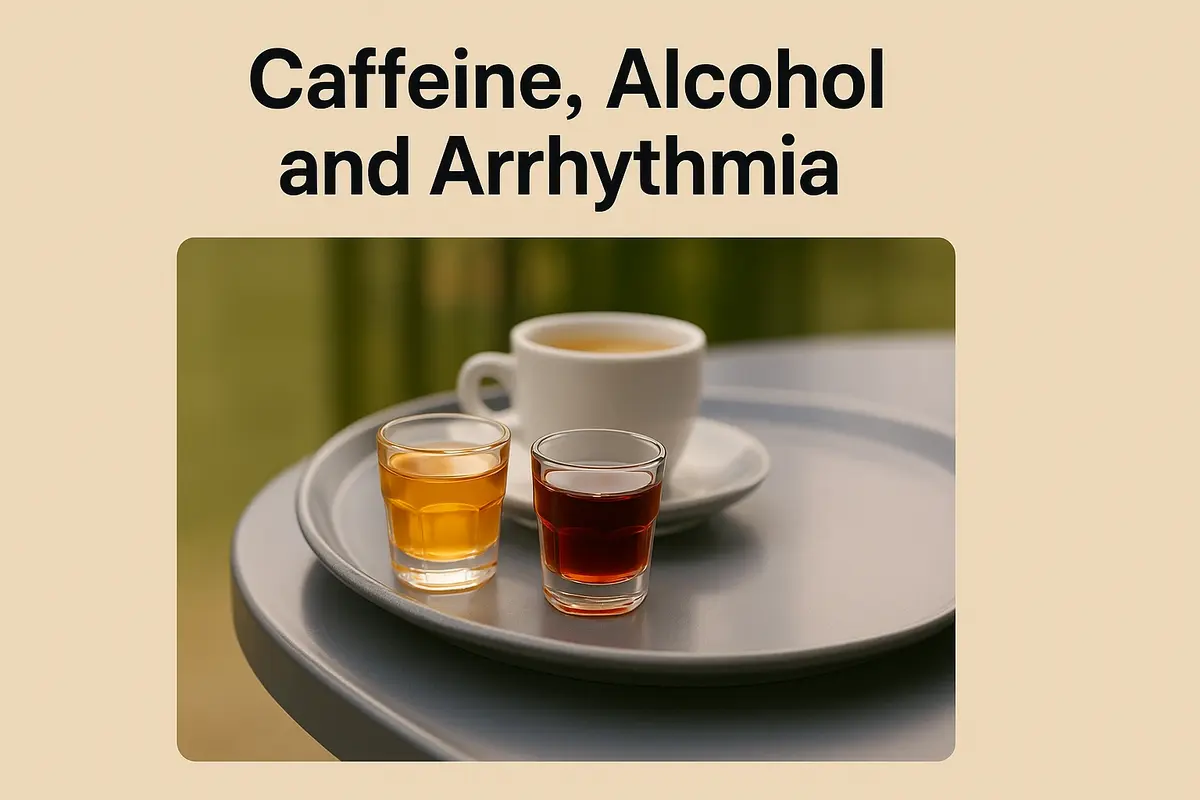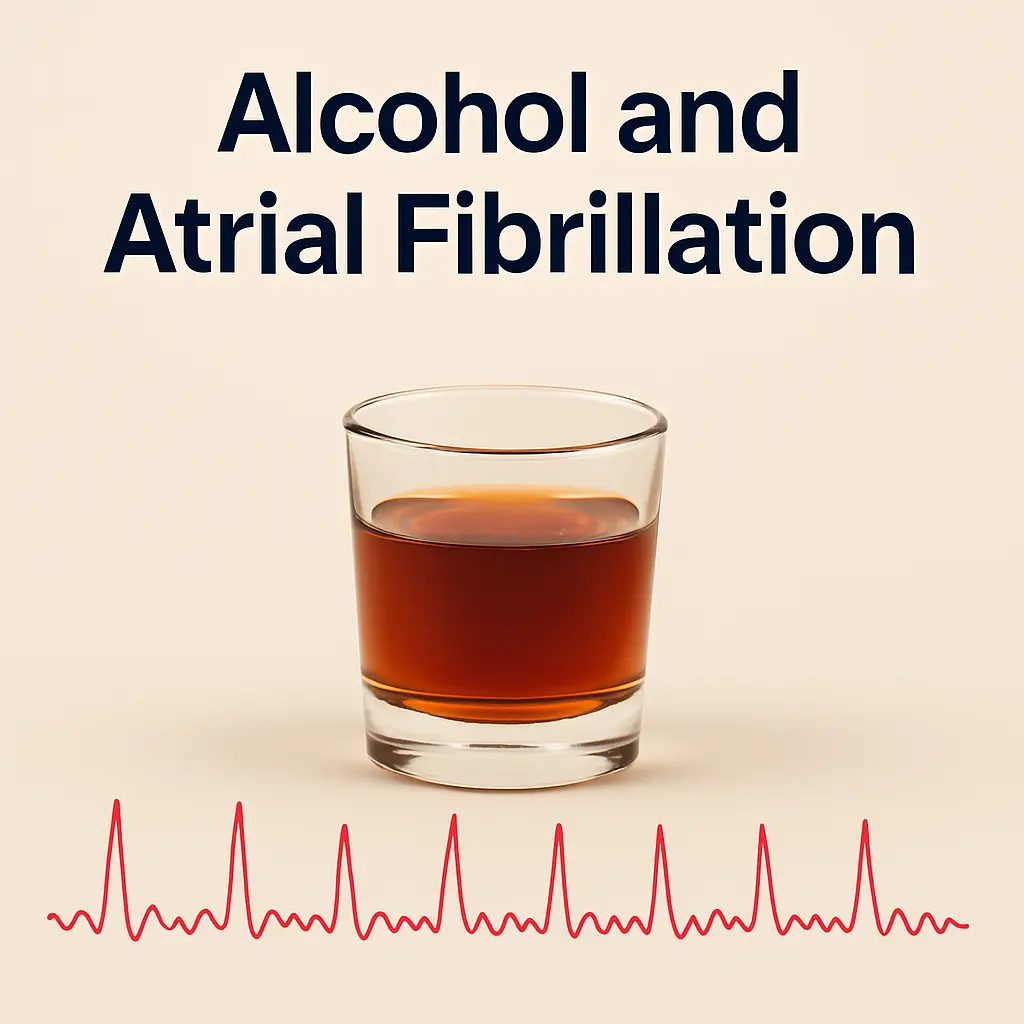Caffeine, Alcohol, and Arrhythmia: What You Need to Know

If you enjoy your morning coffee or unwind with a glass of wine in the evening, you're not alone. Caffeine and alcohol are deeply ingrained in daily routines and social life. But if you're living with arrhythmia (irregular heartbeat), you may wonder whether these substances are safe. Do they increase your risk of arrhythmia episodes? Should they be avoided entirely, or is moderate consumption acceptable?
Our heart clinic believes in empowering patients with reliable, evidence-based guidance. In this article, we delve into the complex relationship between caffeine, alcohol, and arrhythmia. You'll learn how these substances interact with heart rhythm, what current research says, and how to make informed decisions about consumption.
What Is Arrhythmia?
Arrhythmia refers to an abnormal heart rhythm. It can present as a heartbeat that is too fast (tachycardia), too slow (bradycardia), or irregular (fibrillation). Some arrhythmias are harmless, while others may be life-threatening or lead to serious complications such as stroke or heart failure.
Common Types of Arrhythmia:
- Atrial Fibrillation (AFib): The most common form, characterised by rapid and irregular atrial contractions.
- Ventricular Tachycardia: Rapid heartbeat originating from the ventricles.
- Supraventricular Tachycardia (SVT): Abnormally fast heartbeat originating above the ventricles.
- Premature Ventricular Contractions (PVCs): Extra heartbeats that begin in the ventricles.
Symptoms can range from palpitations and dizziness to fainting, chest discomfort, and fatigue.
The Role of Lifestyle in Arrhythmia Management
Lifestyle factors can significantly influence arrhythmia risk and severity. While genetics and structural heart disease play a role, modifiable behaviours such as diet, sleep, stress, and substance use are key components of prevention and control.
Caffeine and Heart Rhythm: Friend or Foe?
Caffeine is a natural stimulant in coffee, tea, energy drinks, chocolate, and certain medications. It works by blocking adenosine receptors in the brain, increasing alertness and reducing fatigue. But what effect does it have on the heart?
Caffeine's Impact on the Cardiovascular System
Caffeine can temporarily:
- Increase heart rate (tachycardia).
- Raise blood pressure.
- Stimulate the release of adrenaline.
These effects have led to the long-standing concern that caffeine might provoke arrhythmias.
Who Should Be Cautious?
- Those with poorly controlled arrhythmia.
- Individuals who experience palpitations or fluttering after caffeine.
- People who are taking stimulant medications or have high anxiety levels.
Expert Insight: Harvard Health advises that individuals who notice caffeine triggering atrial fibrillation symptoms should avoid it, as personal sensitivity varies. This underscores the importance of tailored advice for those with palpitations.
Safe Sources of Caffeine
- Brewed coffee (8 oz): ~95 mg caffeine
- Black tea (8 oz): ~47 mg
- Green tea (8 oz): ~28 mg
- Dark chocolate (1 oz): ~12 mg
Avoid or limit:
- Energy drinks (can contain 200-300+ mg per serving)
- Caffeinated sodas (contain added sugar and artificial ingredients)
Alcohol and Arrhythmia: A Riskier Relationship
Alcohol is widely consumed across cultures, often associated with relaxation, socialisation, and celebration. However, the relationship between alcohol and arrhythmia is more concerning than that of caffeine.
How Alcohol Affects the Heart
Alcohol influences heart rhythm through several mechanisms:
- Alters the autonomic nervous system balance.
- Increases atrial stretch.
- Promotes inflammation.
- Disrupts electrolyte levels (e.g., magnesium, potassium)
Alcohol and Atrial Fibrillation: The "Holiday Heart Syndrome

One of the most documented effects of alcohol on heart rhythm is the so-called Holiday Heart Syndrome, where people experience episodes of atrial fibrillation after binge drinking, especially during holidays or weekends.
Expert Insight: The American Heart Association highlights that alcohol consumption has a significant interplay with cardiac arrhythmia. This emphasises the concerning relationship between alcohol and irregular heart rhythms.
Does the Type of Alcohol Matter?
While all types of alcohol can affect heart rhythm, some studies suggest red wine may contain polyphenols (e.g., resveratrol) with potential heart benefits. However, these potential benefits do not outweigh the risks of alcohol-induced arrhythmia.
Recommended Guidelines
- American Heart Association: If you drink alcohol, do so in moderation. No more than 1 drink per day for women and 2 for men.
- Heart Rhythm Society: People with arrhythmia or at high risk should consider limiting or avoiding alcohol altogether
Signs That Alcohol May Be a Trigger
- Palpitations or fluttering after drinking.
- Episodes of AFib after parties or binge drinking.
- Worsening symptoms on days following alcohol use.
Understanding Individual Sensitivities
Everyone's body reacts differently to caffeine and alcohol. Some people can tolerate small amounts without symptoms. In contrast, others may experience heart rhythm disturbances after a single drink or cup of coffee.
Keep a Symptom Diary
Tracking your intake of caffeine and alcohol alongside symptoms can help identify triggers. Note:
- Time and amount consumed
- Type of beverage
- Symptoms and timing (palpitations, dizziness, etc.)
Safe Consumption Tips for People with Arrhythmia
If you're not ready to completely give up caffeine or alcohol, the key is moderation and mindfulness. Here are some practical strategies:
For Caffeine:
- Opt for decaf or low-caffeine alternatives.
- Drink caffeine earlier in the day to avoid sleep disturbances.
- Avoid caffeine before strenuous activity or stressful events.
- Be cautious with energy drinks, which often combine high caffeine with sugar and other stimulants.
For Alcohol:
- Limit to 1 drink/day (or less if symptoms occur).
- Avoid binge drinking or multiple drinks in one sitting.
- Stay hydrated; alternate alcoholic drinks with water.
- Never mix alcohol with medications unless cleared by your physician.
Lifestyle Alternatives to Boost Energy and Relaxation
If you're reducing caffeine or alcohol, consider healthier alternatives to achieve the same effects:
Natural Energy Boosters
- Exercise: Even a brisk 10-minute walk can energise you.
- Hydration: Dehydration can mimic fatigue.
- Balanced meals: Avoid sugar crashes with protein and fibre.
Relaxation Techniques
- Herbal teas: Chamomile, rooibos, and lemon balm have calming properties
- Mindfulness and meditation: Reduce stress and promote emotional stability.
- Breathwork: Deep breathing activates the parasympathetic nervous system.
- Sleep hygiene: Quality sleep naturally improves energy and reduces anxiety.
When to Seek Medical Advice
If you're unsure how caffeine or alcohol is affecting your arrhythmia, or if you notice worsening symptoms, talk to your heart doctor. Diagnostic tests such as:
- Holter monitor (24-48 hour ECG)
- Event monitor (for longer periods)
- Electrocardiogram (ECG)
It can help pinpoint potential triggers and guide your care plan.
Conclusion: The Bottom Line on Caffeine, Alcohol, and Arrhythmia
Caffeine and alcohol are two of the most commonly consumed substances worldwide. While they are not forbidden for everyone with arrhythmia, they require careful consideration. The key is understanding your response, recognising potential triggers, and practising moderation.
Minor lifestyle adjustments can significantly improve symptoms and overall well-being for many patients. If you're living with arrhythmia, thoughtful choices around what you drink can be just as important as medications or procedures.
Let The Harley Street Heart & Vascular Centre be your partner in navigating these choices with confidence and clarity. Schedule a consultation today to learn how personalised care can keep your heart beating strong and steady.
This write-up has been medically reviewed by Dr. Michael Ross MacDonald, a consultant cardiologist at The Harley Street Heart & Vascular Centre in Singapore, to ensure the accuracy and reliability of the information provided.

